Daily Vocabulary Words: List of Daily Used Words in Leading International Newspapers
Hi there. Welcome to this special section @ Wordpandit.
Our endeavour here is very simple: to highlight important daily vocabulary words, which you would come across in leading newspapers in the country. We have included the following newspapers in our selection:
• The New York Times
• The Washington Post
• Scientific American
• BBC
• The Guardian
• Psychology Today
• Wall Street Journal
• The Economist
We are putting in extensive work for developing your vocabulary. All you have got to do is be regular with this section and check out this post on a daily basis. This is your repository of words that are commonly used and essentially, we are posting a list of daily used words. Hence, this has significant practical application as it teaches you words that are used commonly in leading publications mentioned above.
Visit the website daily to learn words from leading international newspapers.
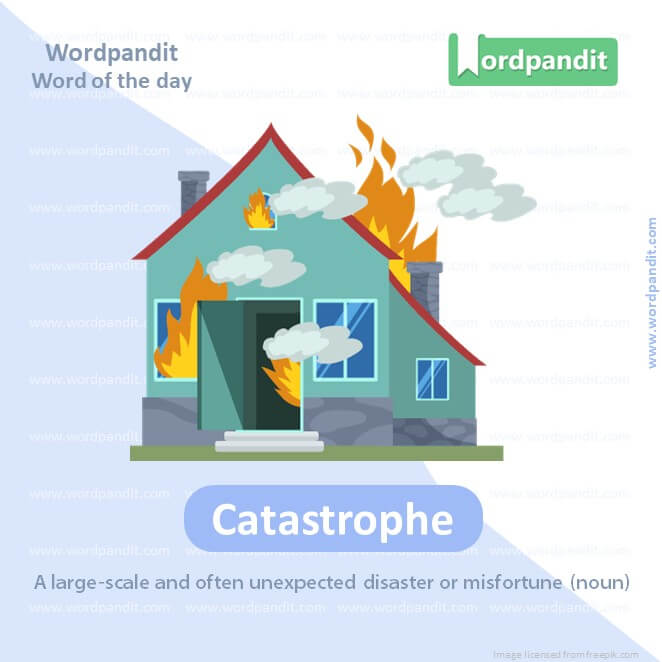
WORD-1: Catastrophe
CONTEXT: the Biden administration has recklessly paved the way for a second Palestinian “Nakba” – or catastrophe – in the name of crushing Hamas
SOURCE: Al Jazeera
EXPLANATORY PARAGRAPH: Imagine you built a tall tower of blocks, and it suddenly crashes down. That big crash or disaster is like a catastrophe. It’s when something really bad happens that we didn’t want or expect.
MEANING: A large-scale and often unexpected disaster or misfortune. (noun)
PRONUNCIATION: cat-uh-STROH-fee
SYNONYMS: disaster, calamity, tragedy, mishap, debacle, ruin
USAGE EXAMPLES:
1. The earthquake was a major catastrophe for the city.
2. Lack of planning led to an economic catastrophe.
3. The play was a complete catastrophe; no one remembered their lines.
4. We must prepare ourselves for potential environmental catastrophes.
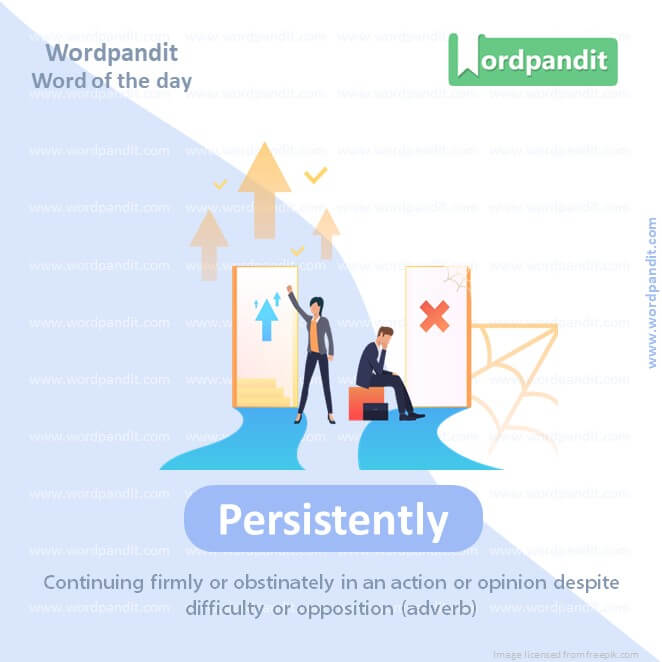
WORD-2: Persistently
CONTEXT: the Israeli government has persistently ignored various international conventions establishing the rights of refugees
SOURCE: Al Jazeera
EXPLANATORY PARAGRAPH: Think of a little bunny that keeps hopping and hopping, and doesn’t stop, even if it gets tired. That’s like being persistently doing something; you keep going and don’t give up.
MEANING: Continuing firmly or obstinately in an action or opinion despite difficulty or opposition. (adverb)
PRONUNCIATION: per-SIS-tent-lee
SYNONYMS: constantly, continually, repeatedly, steadily, unceasingly
USAGE EXAMPLES:
1. She persistently asked her mom for a pet dog.
2. He persistently trained every day for the marathon.
3. The alarm rang persistently until she turned it off.
4. Rain tapped persistently on the window.
WORD-3: Semi-obliterating
CONTEXT: in which the Israeli army appears intent on semi-obliterating the Gaza Strip
SOURCE: Al Jazeera
EXPLANATORY PARAGRAPH: Imagine you have a drawing, and you erase half of it. That’s like semi-obliterating – it’s partly removing or hiding something but not completely.
MEANING: Partially erasing or destroying something. (adjective)
PRONUNCIATION: sem-eye ob-LIT-er-ay-ting
SYNONYMS: blurring, dimming, fading, masking, veiling
USAGE EXAMPLES:
1. The old photo was semi-obliterating with time.
2. Raindrops on the window were semi-obliterating the view outside.
3. The graffiti on the wall was semi-obliterated by new paint.
4. His signature was semi-obliterated by a coffee stain.
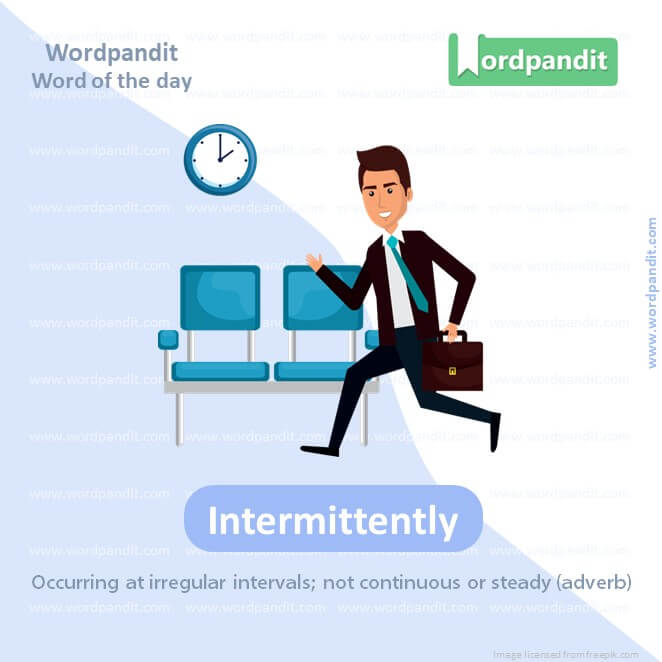
WORD-4: Intermittently
CONTEXT: in which even the vicarious trauma that is allegedly intermittently experienced by US audiences trumps the unmitigated trauma suffered by the people upon whom Israel wages perpetual war.
SOURCE: Al Jazeera
EXPLANATORY PARAGRAPH: Imagine turning a light switch on and off again and again. The light will flash on, then off, then on again. That’s like something happening intermittently – it happens sometimes, then stops, then starts again.
MEANING: Occurring at irregular intervals; not continuous or steady. (adverb)
PRONUNCIATION: in-ter-MIT-ent-lee
SYNONYMS: sporadically, occasionally, periodically, irregularly, off and on
USAGE EXAMPLES:
1. The rain fell intermittently throughout the day.
2. He intermittently glanced at his watch during the meeting.
3. The radio signal was received intermittently due to interference.
4. She coughed intermittently during her speech.
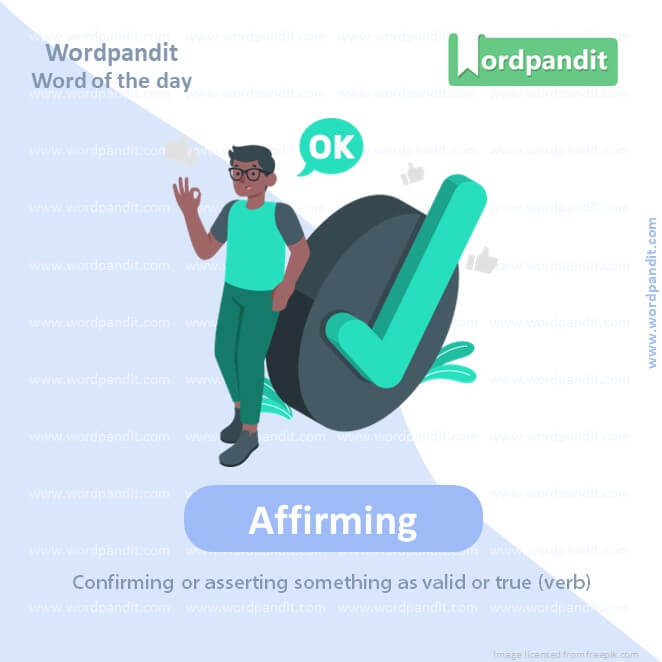
WORD-5: Affirming
CONTEXT: narrative affirming the infinitely superior value of Israeli over Palestinian life.
SOURCE: Al Jazeera
EXPLANATORY PARAGRAPH: Imagine your friend asks if you like ice-cream, and you nod your head saying “yes”. That nodding or saying “yes” is like affirming. It means you’re agreeing or confirming something.
MEANING: Confirming or asserting something as valid or true. (verb)
PRONUNCIATION: af-FIRM-ing
SYNONYMS: confirming, verifying, asserting, validating, attesting
USAGE EXAMPLES:
1. He was affirming his belief in justice.
2. By nodding, she was affirming her agreement.
3. The documents are affirming his identity.
4. The jury was affirming the innocence of the defendant.
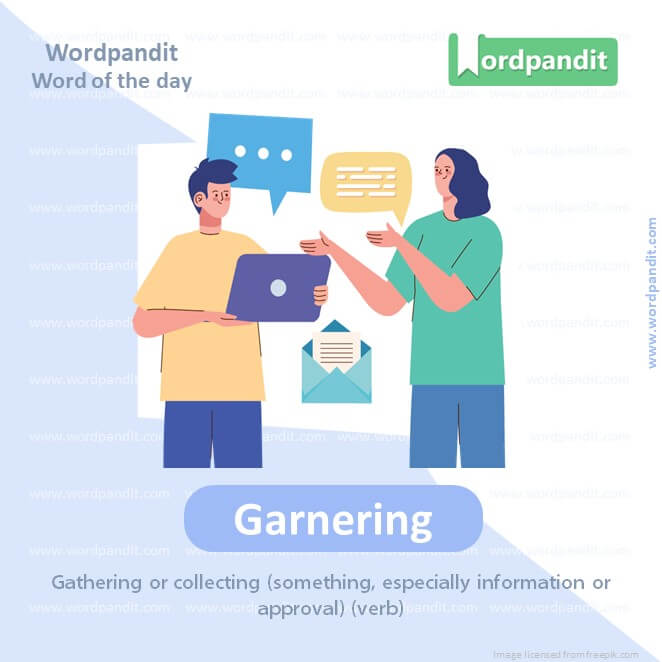
WORD-6: Garnering
CONTEXT: Israel plays up its emotional casualties as a means of garnering additional empathy.
SOURCE: Al Jazeera
EXPLANATORY PARAGRAPH: Imagine you’re collecting colorful stones from the beach in a bucket. That’s like garnering. It means you’re gathering or collecting something.
MEANING: Gathering or collecting (something, especially information or approval). (verb)
PRONUNCIATION: GAR-ner-ing
SYNONYMS: collecting, gathering, accumulating, amassing, assembling
USAGE EXAMPLES:
1. She’s been garnering support for her campaign.
2. The movie has been garnering positive reviews.
3. He spent years garnering a collection of rare stamps.
4. The news article was based on information garnered from various sources.
WORD-7: Presumably
CONTEXT: victims in the Gaza Strip would presumably produce a number in the vicinity of 2.3 million, the current population of the Palestinian enclave.
SOURCE: Al Jazeera
EXPLANATORY PARAGRAPH: Imagine you see dark clouds and think it might rain soon. That’s like saying “presumably it will rain”, which means you’re making a good guess based on what you see or know.
MEANING: Used to convey that what is asserted is very likely though not known for certain. (adverb)
PRONUNCIATION: pre-SUM-uh-bly
SYNONYMS: probably, likely, ostensibly, apparently, seemingly
USAGE EXAMPLES:
1. Presumably, the meeting will end by noon.
2. He didn’t answer the phone, presumably because he was busy.
3. Presumably, she’s the team leader given how everyone respects her.
4. The book is, presumably, based on a true story.
WORD-8: Pulverisation
CONTEXT: the pulverisation of apartment buildings and neighbourhoods
SOURCE: Al Jazeera
EXPLANATORY PARAGRAPH: Imagine you have a big cookie and you crush it into tiny crumbs. That act of turning the big cookie into little bits is like pulverisation. It’s making something into powder or tiny pieces.
MEANING: The action of reducing a substance to fine particles or powder. (noun)
PRONUNCIATION: pul-ver-eye-ZAY-shun
SYNONYMS: grinding, crushing, milling, powdering, triturating
USAGE EXAMPLES:
1. The pulverisation of rocks is necessary for road construction.
2. The machine aids in the pulverisation of grains.
3. Pulverisation of the samples ensures accurate testing.
4. The ancient method of pulverisation involved the use of heavy stones.
WORD-9: Perpetual
CONTEXT: let alone given a damn, about the perpetual suffering and trauma of Palestinians
SOURCE: Al Jazeera
EXPLANATORY PARAGRAPH: Imagine a river that flows and flows and never stops, day and night. That’s like something being perpetual. It means it keeps going on forever and doesn’t stop.
MEANING: Never ending or changing; continuous. (adjective)
PRONUNCIATION: per-PET-chu-al
SYNONYMS: unending, everlasting, eternal, continuous, ceaseless
USAGE EXAMPLES:
1. The mountain range seemed to stretch in perpetual beauty.
2. The city was in a state of perpetual construction.
3. The clock was a gift, symbolizing their perpetual love.
4. The garden was a place of perpetual tranquility.
WORD-10: Indignities
CONTEXT: for generations, have endured the loss, theft, deprivations, indignities, humiliations, and, of course, lethal ferocity committed by an apartheid state.
SOURCE: Al Jazeera
EXPLANATORY PARAGRAPH: Imagine someone making fun of you or treating you in a way that makes you feel bad or embarrassed. Those bad actions or words are like indignities. They’re things that hurt your pride or dignity.
MEANING: Actions or situations that insult or offend someone or make them lose respect. (noun)
PRONUNCIATION: in-DIG-ni-tees
SYNONYMS: insults, affronts, slights, humiliations, outrages
USAGE EXAMPLES:
1. He endured many indignities in his early career.
2. The captives were subjected to various indignities.
3. Her speech highlighted the indignities faced by many.
4. They bravely bore the indignities heaped upon them.
Vocabulary Meaning
In the ocean of language learning, ‘vocabulary meaning’ is akin to the colorful coral reefs that add depth and vibrancy to communication. Yet, infusing our interactions with this vibrancy is often a challenge for many language learners. The crux lies in effectively deciphering and employing the ‘vocabulary meaning’.
Learning ‘vocabulary meaning’ isn’t about merely gluing words to their definitions. It’s about forming a deep understanding and connection with these words that transcends rote learning. To gain a comprehensive grasp of ‘vocabulary meaning’, one needs to navigate beyond textbook definitions and commit to exploiting diversified resources such as novels, films, music, articles, and digital content. This allows one to encounter vocabulary in a variety of contexts and actual usage, giving deeper insight into their meaning.
However, understanding ‘vocabulary meaning’ involves another essential aspect—memory retention. Techniques such as spaced repetition and the Leitner System offer effective methodologies to maintain and consolidate the ‘vocabulary meaning’. Additionally, leveraging mnemonic strategies can help etch words into your memory by linking them with unique stories or imagery that are personal and easily recallable.
Another way of mastering ‘vocabulary meaning’ is by immersing yourself in the language. Engage in regular conversations with native speakers if possible or utilize language exchange platforms to practice your skills. This not only bolsters your understanding of how the vocabulary is used but also helps articulate the ‘vocabulary meaning’ in the societal and cultural contexts.
In conclusion, gaining a robust grasp of ‘vocabulary meaning’ is a journey rather than an end goal. It requires dedication, perseverance and most importantly, a multi-faceted approach that includes diversified resources, effective memory strategies, and real-life application. With these strategies in place, the depths of ‘vocabulary meaning’ are no longer daunting but become an enchanting exploration of language.











